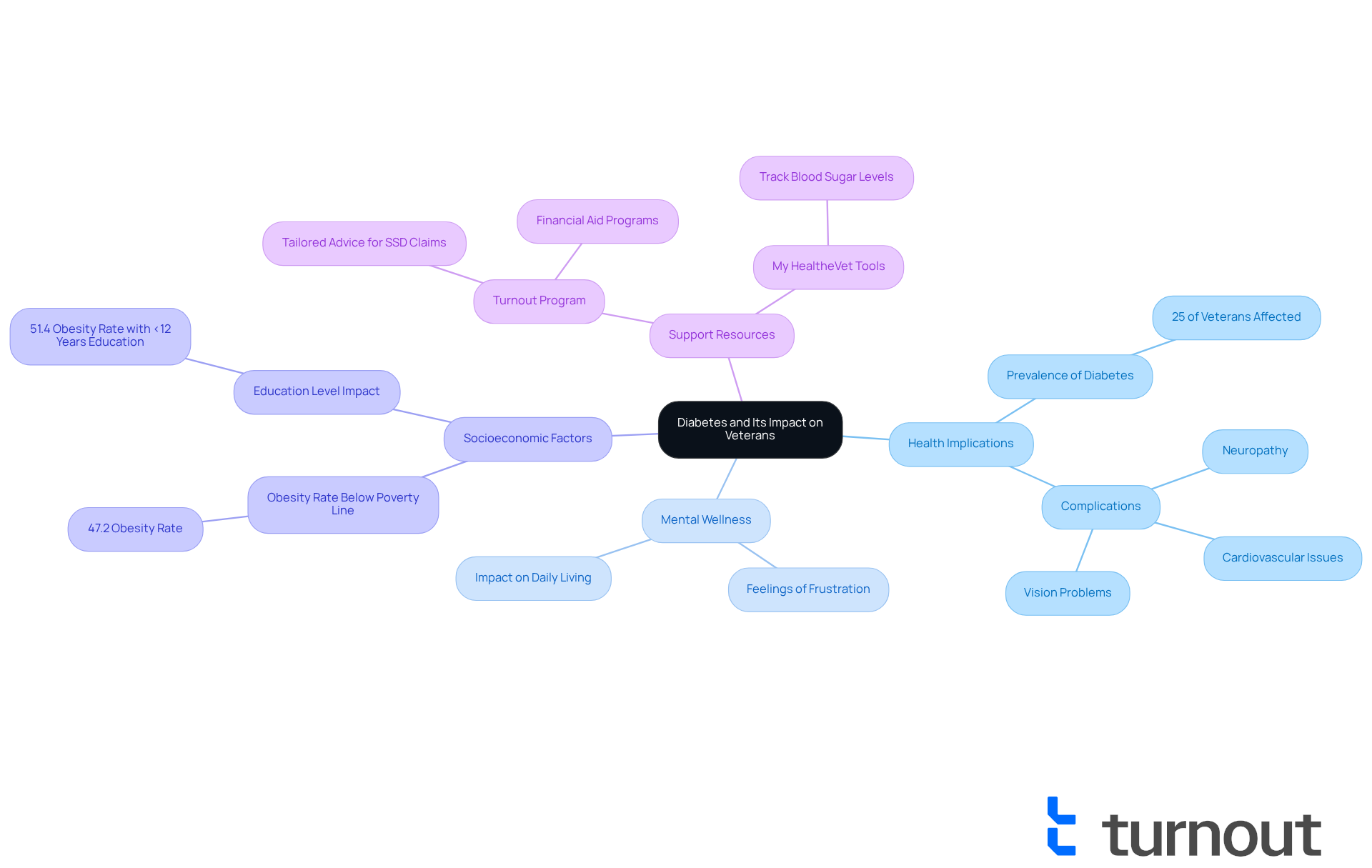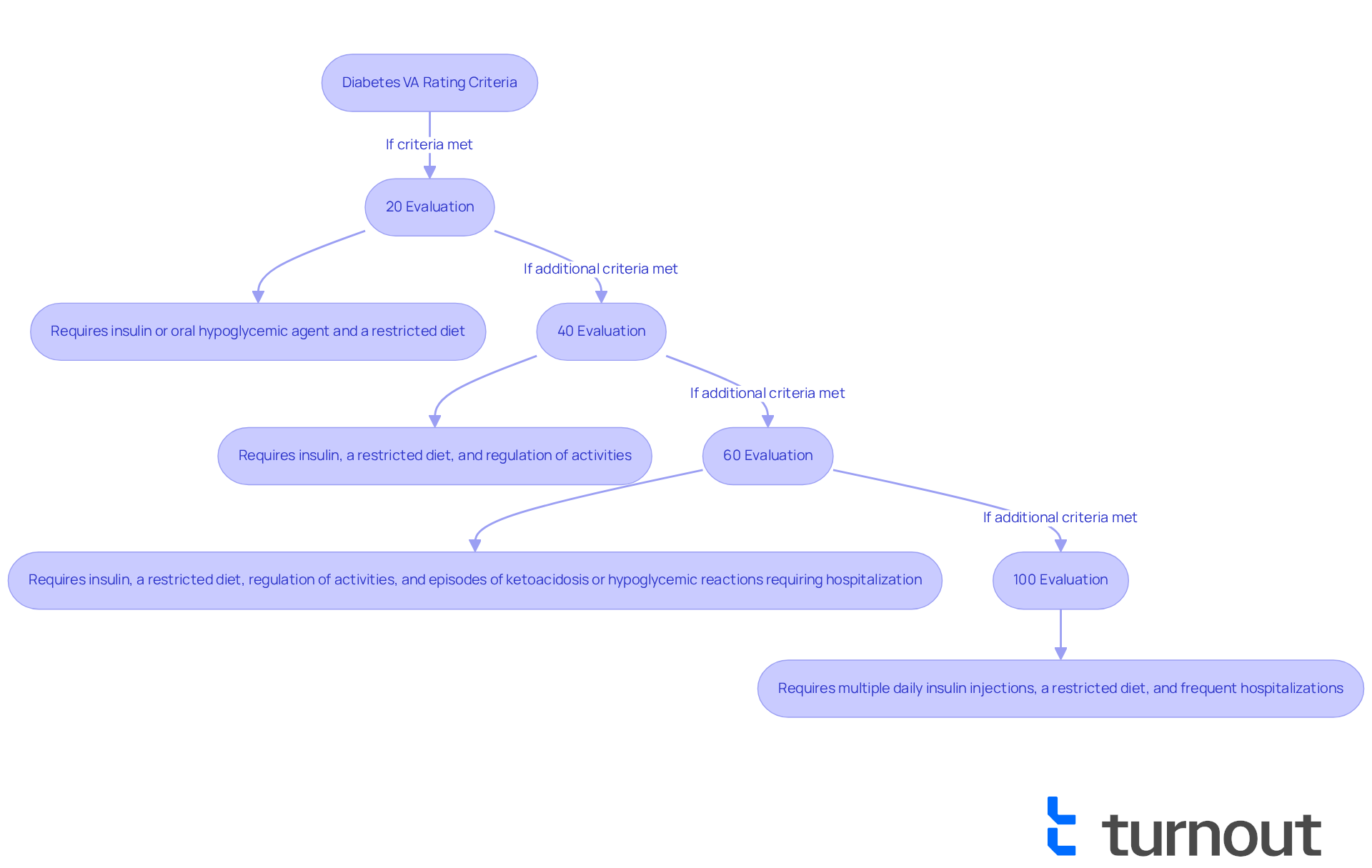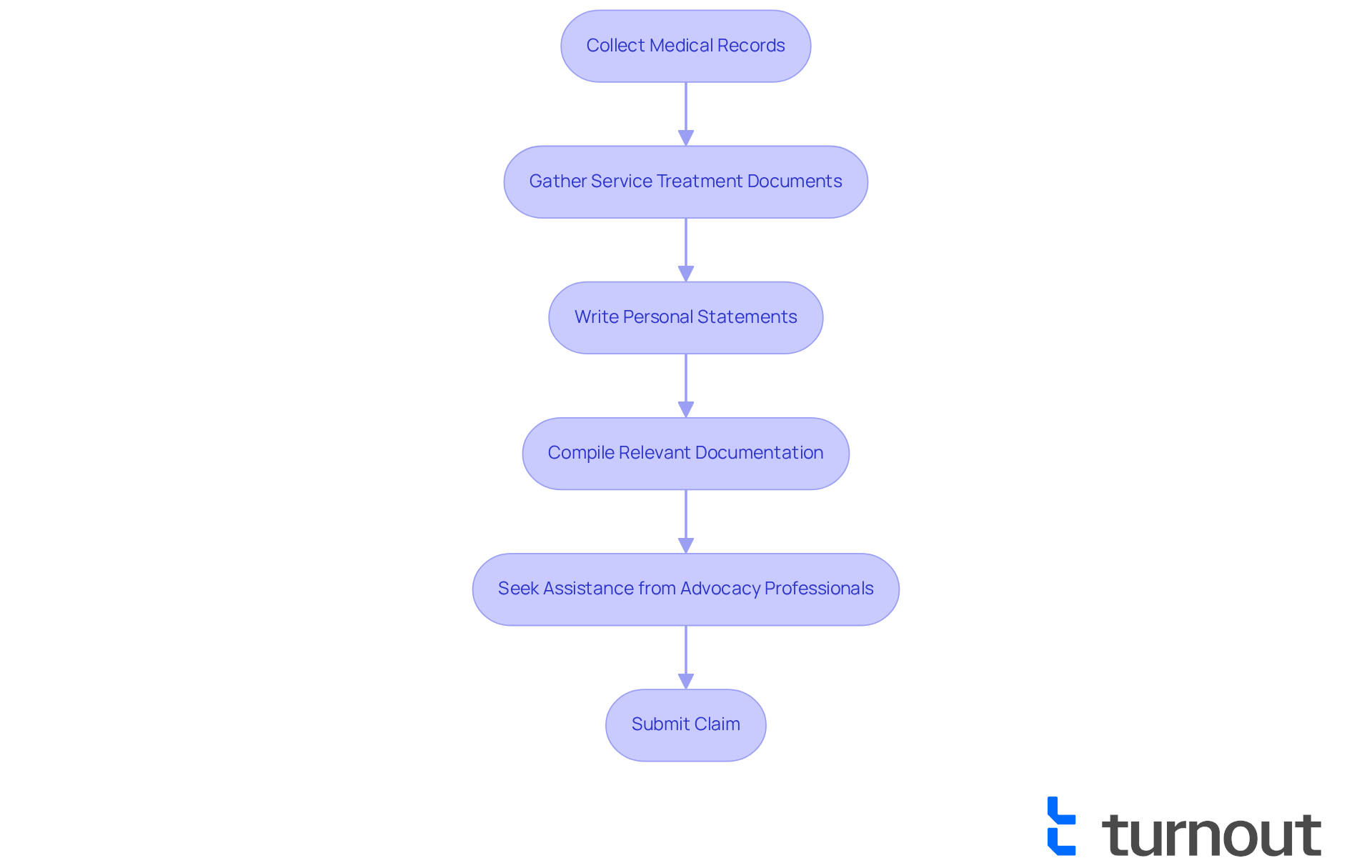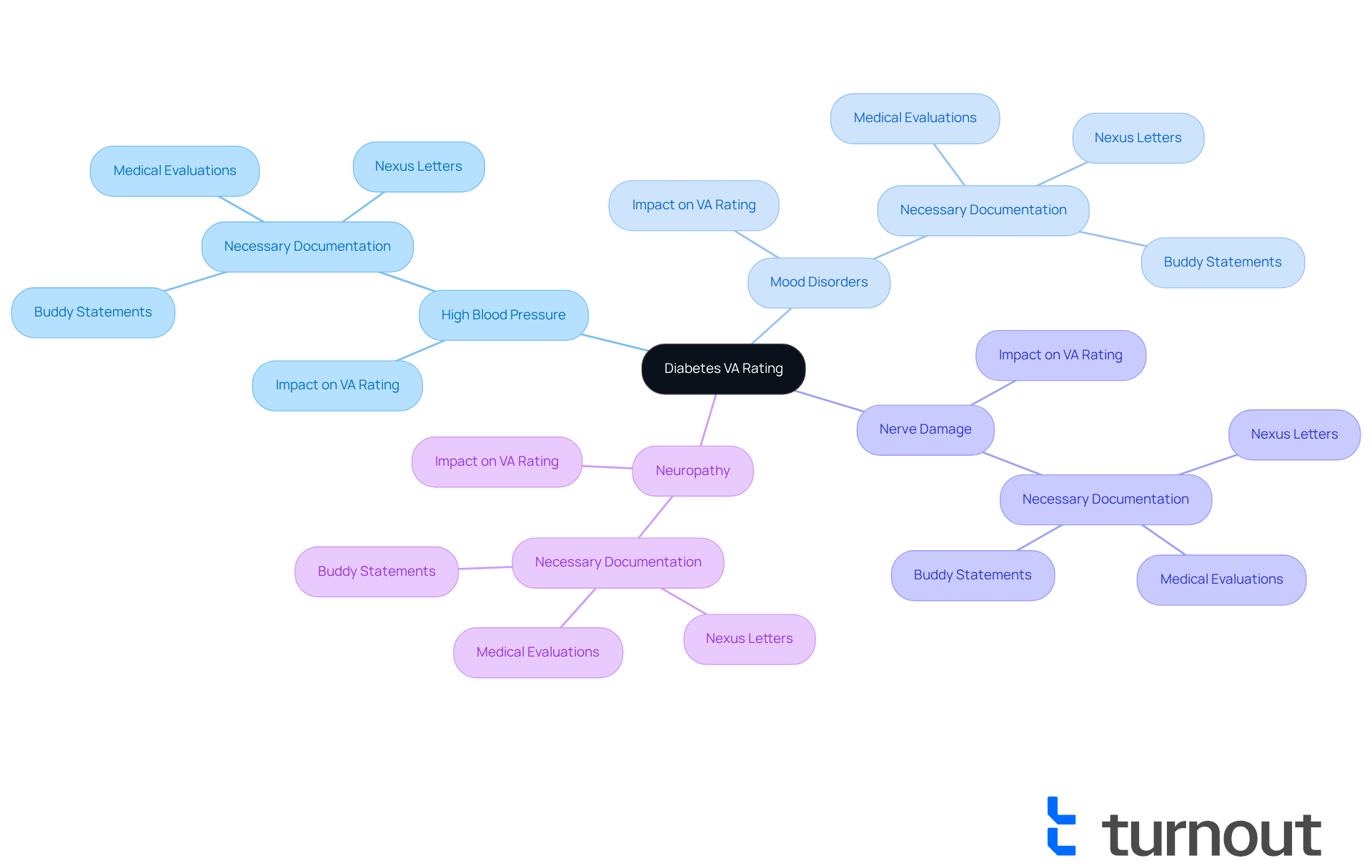Overview
This article aims to help veterans understand the Diabetes VA rating process, acknowledging the challenges you may face in securing the benefits you deserve. It's crucial to accurately document the severity of your condition and any complications to ensure you receive appropriate support.
Veterans' diabetes ratings can be influenced by various factors, including:
- Insulin use
- Dietary restrictions
- Related health issues
We understand that navigating this process can be overwhelming, but comprehensive medical documentation is key to effectively supporting your claims.
Remember, you are not alone in this journey. We're here to help you through each step, ensuring that your experiences and needs are recognized and addressed. By focusing on your unique situation, we can work together to secure the benefits that support your health and well-being.
Introduction
Diabetes is not just a health condition; for many veterans, it presents a life-altering challenge that profoundly impacts their physical and mental well-being. We understand that nearly 25% of former service members grapple with this chronic illness, and it's crucial to comprehend the nuances of diabetes and its implications on VA ratings.
This guide offers veterans a comprehensive look into the complexities of diabetes management, the criteria for VA disability ratings, and the steps necessary to secure the benefits they deserve.
How can veterans effectively navigate this intricate system and ensure their health needs are met while facing the additional hurdles posed by this condition? You're not alone in this journey, and we're here to help you find the support you need.
Define Diabetes and Its Impact on Veterans
Diabetes is a chronic condition that affects the body’s ability to use insulin effectively, leading to elevated blood sugar levels. For former service members, the implications of blood sugar issues extend far beyond physical health. They can significantly impact daily living, mental wellness, and job-related abilities. Alarmingly, nearly 25% of veterans are affected by this condition, highlighting the urgent need to address this health crisis within the veteran community.
Veterans living with diabetes often face various complications, such as:
- Neuropathy
- Cardiovascular issues
- Vision problems
These complications can worsen existing health conditions and diminish overall quality of life. As one individual shared, "I feel that this program has given me a new lease on life. I’m a lot more positive, I have a lot more energy, I feel better about myself."
The daily challenges of managing diabetes can also affect mental health. Many former service members experience feelings of frustration and helplessness. One participant noted, "You cannot control the meal that’s being served…if you get out on the run and have to get something to eat or if you are invited as a guest to an event."
Understanding the effects of diabetes va rating is crucial for veterans navigating the VA benefits system, as these factors directly influence eligibility and available support. Turnout provides essential resources and support, including tailored advice for SSD claims and financial aid programs, to help individuals manage their health effectively. It’s clear that customized strategies addressing both physical and mental health aspects of this condition are needed, as many former service members do not engage in recommended self-management practices. An experienced individual emphasized, "By selecting healthier low-carb choices, I’m remaining satisfied longer from one meal compared to when I was consuming processed snacks."
Moreover, socioeconomic factors significantly contribute to blood sugar issues. The obesity rate among former military personnel living below the poverty line is a staggering 47.2%. The interplay between chronic health conditions and the daily lives of veterans underscores the importance of comprehensive support systems. Organizations like Turnout can play a vital role in alleviating these challenges and improving health outcomes. Remember, you are not alone in this journey, and we’re here to help.

Explore VA Rating Criteria for Diabetes
Navigating the disability assessment process with the VA can feel overwhelming, especially when considering how the diabetes VA rating affects daily life. The VA allocates evaluations based on the severity of the condition, ranging from 0% to 100%. We understand that key factors, such as the necessity for insulin, dietary restrictions, and complications, play a significant role in these evaluations.
For example, if you require insulin and face considerable challenges, like diabetic neuropathy or frequent hospital visits, your evaluation may be higher than someone managing their diabetes solely through diet. Specifically:
- A 20% evaluation is granted when insulin or an oral hypoglycemic agent is needed alongside a restricted diet.
- A 40% evaluation requires insulin, a restricted diet, and regulation of activities to prevent blood sugar fluctuations.
- At the 60% level, veterans must show the need for insulin, a restricted diet, and a history of ketoacidosis or hypoglycemic reactions that lead to hospitalization or regular visits to a diabetic care provider.
Additionally, the VA acknowledges that secondary issues related to diabetes, such as peripheral neuropathy, can increase your overall disability rating.
Understanding these criteria is essential for former service members as they prepare their diabetes VA rating claims. It’s crucial to submit thorough medical documentation that supports your case. Successful claims often hinge on detailed medical records that illustrate the progression of your condition and its impact on your daily functioning. We want you to know that ongoing medical documentation and clear testimony are vital in this process.
Significantly, one in four individuals enrolled in VA health care services has a form of high blood sugar. This underscores the importance of comprehending the assessment criteria. Remember, as Marc Whitehead highlights, your medical records are crucial for determining your health rating, specifically your diabetes VA rating related to blood sugar conditions. You are not alone in this journey; we’re here to help you navigate the complexities of your claim.

Establish Service Connection for Diabetes Claims
We understand that establishing a service connection for health issues can be a daunting task for veterans. To strengthen your claim, it’s essential to provide compelling proof linking your health issue to your military service. This evidence may include:
- Medical records
- Service treatment documents
- Personal statements that detail how your service may have contributed to your health condition
For instance, exposure to certain chemicals, such as those associated with Agent Orange, or unique experiences during your service can be crucial elements. We encourage you to compile all relevant documentation, including a formal diagnosis and treatment history, to support your claim effectively.
Additionally, seeking assistance from advocacy professionals, like the trained nonlawyer advocates at Turnout, can significantly enhance the strength of your application. They help ensure that all necessary evidence is presented clearly and effectively. Remember, Turnout is not a law firm and does not provide legal representation, but their services can facilitate access to government benefits, making the claims process easier.
Many former service members have successfully connected their health conditions to their military duty by sharing detailed narratives of their experiences and the impact of their service on their well-being. You are not alone in this journey; we’re here to help you navigate the process and advocate for the support you deserve.

Assess Secondary Conditions and Their Impact on VA Ratings
Veterans who are grappling with blood sugar issues often face additional complications, such as high blood pressure, mood disorders, or nerve damage. These challenges can further complicate their health status and the assessments they undergo with the VA, especially in relation to diabetes VA rating, as high blood pressure is a common secondary concern for former service members dealing with blood sugar problems. It’s crucial for you to evaluate these issues, particularly diabetes VA rating, when submitting your claims, as they can lead to additional evaluations and benefits.
For instance, if your diabetes VA rating indicates neuropathy, you might qualify for an additional rating for that condition. Proper documentation—like medical evaluations, nexus letters, and buddy statements—is essential to ensure that all relevant circumstances are considered in your overall assessment. By thoroughly addressing these secondary conditions in your claims, you can enhance your chances of securing the benefits you deserve. Remember, you are not alone in this journey; we’re here to help you navigate through these challenges.

Conclusion
Diabetes is a significant health concern for veterans, impacting not just their physical well-being but also their mental health and overall quality of life. We understand that the complexities of managing this chronic condition can feel overwhelming, especially with the unique challenges faced by former service members. It’s essential to grasp the implications of diabetes VA ratings and the support available through the VA system.
In this guide, we’ve thoroughly examined key aspects such as the impact of diabetes on veterans, the criteria for VA ratings, and the importance of establishing a service connection. Addressing both the medical and psychological nuances of diabetes is crucial for veterans navigating the VA benefits system. Recognizing the role of secondary conditions, such as neuropathy and high blood pressure, can significantly influence the evaluation process and the benefits awarded.
Ultimately, the journey to managing diabetes and accessing the necessary support is not one that veterans need to undertake alone. By leveraging available resources, including advocacy services and comprehensive medical documentation, veterans can enhance their claims and secure the benefits they rightly deserve. Remember, taking proactive steps in understanding and addressing diabetes not only improves individual health outcomes but also fosters a stronger, more resilient veteran community. You are not alone in this journey, and we’re here to help.
Frequently Asked Questions
What is diabetes and how does it affect veterans?
Diabetes is a chronic condition that impairs the body's ability to use insulin effectively, leading to elevated blood sugar levels. For veterans, it can significantly impact daily living, mental wellness, and job-related abilities, with nearly 25% of veterans affected by this condition.
What complications do veterans with diabetes face?
Veterans living with diabetes may experience complications such as neuropathy, cardiovascular issues, and vision problems, which can worsen existing health conditions and diminish overall quality of life.
How does diabetes affect the mental health of veterans?
Managing diabetes can lead to feelings of frustration and helplessness among veterans. Many struggle with dietary restrictions and the challenges of maintaining a healthy lifestyle in various social situations.
Why is understanding diabetes important for veterans navigating the VA benefits system?
Understanding the effects of diabetes is crucial for veterans because it directly influences their eligibility for VA benefits and the support available to them.
What resources does Turnout provide for veterans with diabetes?
Turnout offers essential resources and support, including tailored advice for Social Security Disability claims and financial aid programs, to help veterans manage their health effectively.
What factors contribute to blood sugar issues among veterans?
Socioeconomic factors play a significant role, with a reported obesity rate of 47.2% among former military personnel living below the poverty line, highlighting the need for comprehensive support systems.
How can veterans improve their management of diabetes?
Veterans can enhance their diabetes management by selecting healthier low-carb food choices, which can lead to increased satisfaction and better health outcomes compared to consuming processed snacks.




